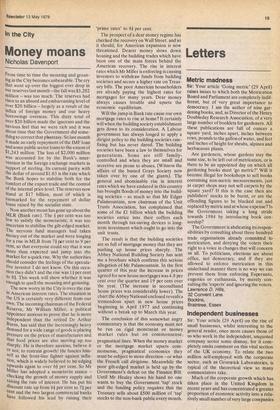In the City
Money moans
Nicholas Davenport
From time to time the moaning and groaning in the City becomes unbearable. The cry that went up over the biggest ever drop in our reserves last month —the fall was $3,282 rflillion — was too much. The reserves had risen to an absurd and embarrassing level of over $20 billion — largely as a result of the influx of foreign money and our heavy borrowings overseas. This dizzy total of over $20 billion made the ignorant and the envious feel that we were rich and it was about time that the Government did something to correct that phantasy. So last month it made an early repayment of the IMF loan and some public sector loans to the extent of $1,243 million. The loss of $2,000 million was accounted for by the Bank's intervention in the foreign exchange markets in support of sterling. Its current parity with the dollar of around $1.83 is the rate which the Bank hopes to stabilise both for the Comfort of the export trade and the control of the internal price level. The reserves now stand at $17 billion, most of which is earmarked for the repayment of dollar loans raised by the socialist state.
Now another moan has gone up about the MLR (Bank rate). The 4 per cent was too low to satisfy the monetarists; it was too uncertain to stabilise the gilt-edged market. The nervous fund managers had taken Money out of the market and were longing for a rise in MLR from 74 per cent to 9 per Cent, so that everyone could say that it was More than expected and jump into the market for a quick rise. Why the authorities Should consider the feelings of the speculative investor I do not know. On this occasion they didn't and the rise was 14 per cent to R. This week will show whether it was enough to quell the moaning and groaning.
The new worry in the City is over the rise in American interest rates. The situation in the US is certainly very different from our own. The incoming chairman of the Federal Reserve, Mr William Miller, a political 93Pointee anxious to prove that he is more independent than the retired Dr Arthur Burns, has said that the increasingly heavy demand for a wide range of goods is placing pressure on the prices of manufactures and that food prices are also moving up too Sharply. He is therefore anxious, believe it or not, to restrain growth! He fancies himself as the front-line fighter against inflation, which is widely believed to be edging uPwards again to over 64 per cent. So Mr Miller has adopted a monetarist stance — checking the growth of money supply and raising the rate of interest. He has put his discount rate up from 64 per cent to 71 per cent and the two largest commercial banks have followed his lead by raising their
'prime rates' to 81 per cent.
The prospect of a dear money regime has checked the recovery on Wall Street. and so it should, for American expansion is now threatened. Dearer money slows down housing and the building trades which have been one of the main forces behind the American recovery. The rise in interest rates which Mr Miller is enforcing is causing investors to withdraw funds from building societies and secure a higher rate on Treasury bills. The poor American householders are already paying the highest rates for mortgages for many years. Dear money always causes trouble and upsets the economic equilibrium.
Will the jump in Bank rate cause our own mortgage rates to rise at home? It certainly will when the building society establishment gets down to its consideration. A Labour government has always longed to apply a dirigist policy to the building societies ratefixing but has never dared. The building societies have been a law to themselves for generations. Some are still familycontrolled and when they are small and secretive are prone to abuses. (Witness the affairs of the busted Grays Society now taken over by one of the giants). The general and abominable rise in interest rates which we have endured in this country has brought floods of money into the building societies — so much so that Mr Edgar Palamountain, now chairman of the Unit Trusts Association, has complained that some of the £1 billion which the building societies entice into their coffers each month through tax-saving devices is longterm investment which ought to go into the unit trusts.
The result is that the building societies are so full of mortgage money that they are pushing up house prices sharply. The Abbey National Building Society has sent me a brochure which confirms this serious allegation of Mr Palamountain. In the first quarter of this year the increase in prices agreed for new house mortgages was 4.8 per cent over the quarter and 19 per cent over the year. (The increase in secondhand house prices was considerably lower). The chart the Abbey National enclosed reveals a tremendous spurt in new house prices ' beginning in April 1977 and continuing without a break up to March this year.
The conclusion of this somewhat angry commentary is that the economy must not be run on rigid monetarist or money market rules but on commonsense,
pragmatical lines. When the money market or the mortgage market upsets commonsense, pragmatical economics they must be subject to more direction —or what the French call dirigisme. Meanwhile the poor gilt-edged market is held up by the Government's defeat on the Finance Bill. Until Mr Healey shows his hand no one wants to buy the Government 'tap' stock and the funding policy requires that the Treasury sells about £500 million of 'tap' stocks to the non-bank public every month.


































 Previous page
Previous page